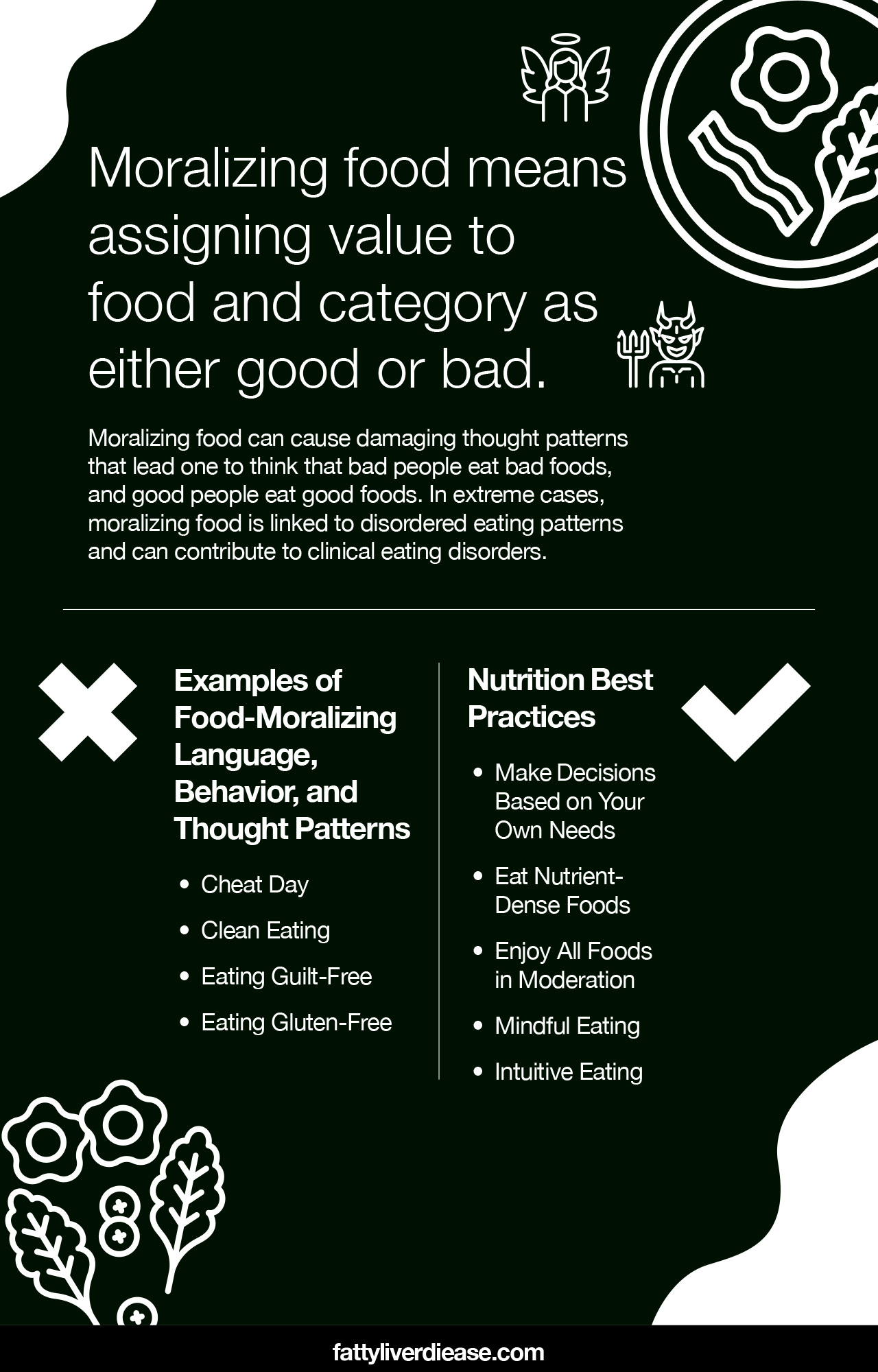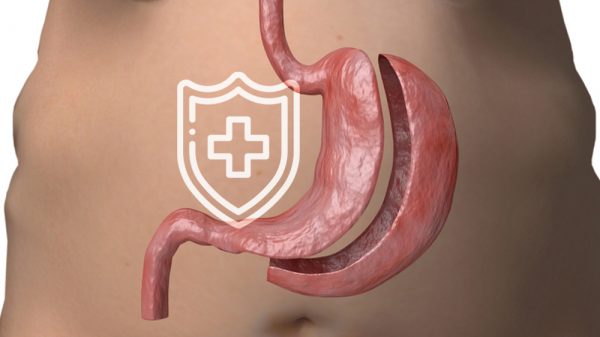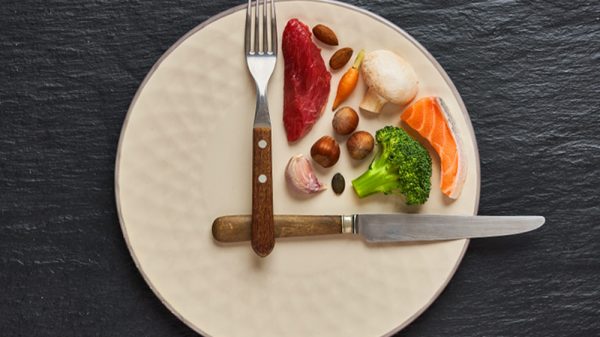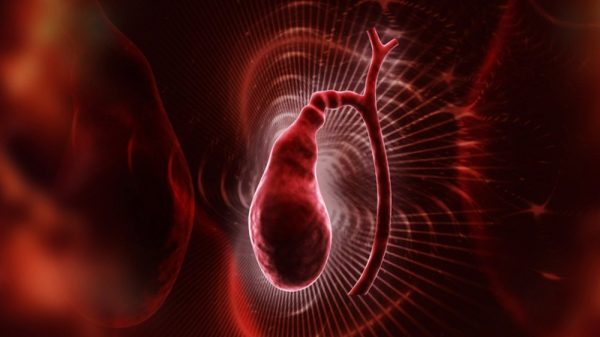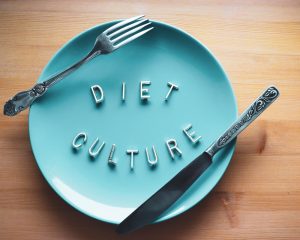The idea of moralizing food has been going on for decades in popular culture. However, only recently has the moralization of food been identified and named. While the moralization of food originally began as an arbitrary way to simply designate healthy and unhealthy foods, it has evolved into something that is detrimental for many people. Read on to find out when it means to moralize food and why as a society we need to stop doing it.
What Does It Mean to Moralize Food?
Moralizing food means assigning value to food and category as either good or bad.
Moralizing food is also attached to the idea that if you eat “bad” food, you are contributing to bad health or other negative consequences. If you eat “good” food, then you are doing the morally right thing and supporting your health. Moralizing food can cause damaging thought patterns that lead one to think that bad people eat bad foods, and good people eat good foods. In extreme cases, moralizing food is linked to disordered eating patterns and can contribute to clinical eating disorders.
Moralizing food is an underpinning of diet culture, which is society’s interest and sometimes obsession with thinness, wellness, and following restrictive diets. As a result, moralizing food is tied to negative physical and psychological impacts. Why should we stop moralizing food? Giving foods moral value can lead to severely restricting food intake, excessive weight loss, distortions in body image, and disordered eating habits.
Refraining from using moral language when it comes to food can help us reframe our idea of food and encourage healthier eating habits, ultimately leading to better overall health and well-being.
Examples of Food-Moralizing Language, Behavior, and Thought Patterns
So many of us moralize food, even without realizing it. Thoughts as simple as “I deserve a treat,“ or “I just ate french fries, that was so unhealthy” are simple ways that many of us moralize food on a regular basis. It’s first important to identify the moralizing language and thought patterns we might recognize in ourselves or in external marketing strategies and social contexts before we work on breaking down and reframing these thought patterns. Here are a few examples you may be familiar with.
Cheat Day
The concept of a cheat day or a cheat meal is a very clear way that diet culture has influenced us to categorize certain foods as “bad.” Diet culture has told us to save “bad“ foods for cheat days or cheat meals. However, by feeling like you’ve cheated, there is an inherent sense of guilt built into these meals. This, in turn, can lead to unhealthy cycles of cheating and “making up for“ the cheap meals by restricting and eating only “clean“ foods.
Clean Eating
Clean eating is a popular health and wellness trend that implies that certain foods will detoxify the body. Describing certain foods and eating patterns as “clean” implies that other foods and eating patterns are “dirty.” The term “clean” should be reserved for other contexts, like cleaning your room or cleaning the kitchen.
Guilt-Free
“Guilt-free” is often a marketing strategy used for foods that are sugar-free or otherwise regarded as “healthy.” Using this term implies that we should feel guilty about consuming certain foods. You will often notice “guilt-free” used in marketing campaigns for diets or products.
Gluten-Free
Eating gluten-free is very important when an individual has a legitimate gluten allergy or sensitivity, like Celiac disease. However, “gluten-free” has somehow become synonymous with “healthy,” even though gluten is not an issue for the vast majority of the population.
Nutrition Best Practices
At the end of the day, nutrition and food isn’t a moral issue. Our bodies need food to fuel our energy and to carry out all biological processes. Here are a few tips for eating in a way that’s healthy for both the body and mind.
Make Decisions Based on Your Own Needs
If you decide to avoid certain foods or moderate your intake of certain foods, it should be based on your preferences, individual needs, reading, and research. I am to make food choices based on your own observations, research, and advice from your doctor and a registered dietitian. Just because an influencer says that avoiding gluten will heal your gut, that does not mean that you should go and eliminate all gluten from your diet. Many influencers do not have education or background research, and you shouldn’t apply what they choose to eat to your nutrition choices. Always do what works best for your needs.
Eat Nutrient-Dense Foods
Eating mainly nutrient-dense foods is an important part of establishing healthy and balanced eating habits. When our bodies are getting the nutrients they need, we are more likely to feel full and satisfied, and less likely to overeat. It’s crucial to get a balance of both macronutrients and micronutrients in your daily diet.
The three macronutrients that the body uses to carry at all biological processes are protein, carbohydrates, and fat.
Dietary protein offers essential amino acids, which are necessary for the body to reduce muscle tissue, enzymes, neurotransmitters, and our moments. Essential amino acids are involved in nearly all biological processes, and we must obtain them from the foods we eat. The best sources of protein that offer optimal ratios of essential amino acids are animal products such as eggs, lean meats, dairy, and fish. Plant proteins also offer essential amino acids, though not in optimal ratios. It’s important to combine plant proteins throughout the day if you follow a primarily plant-based diet. Excellent sources of plant proteins include nuts, seeds, beans, and whole grains. A bonus of including plenty of protein in your diet is that protein is digested more slowly, and helps keep you more full for a longer period of time.
Dietary fat it’s also a vital macronutrient for supporting numerous biological processes. The body utilizes fat for supporting immune health, processes that support homeostasis, and supporting cellular structures. Like protein, fat is also digested slowly and helps increase satiety.
Carbohydrates provide us with a solid energy source. The body breaks down carbs into glucose that power cellular processes in all tissues. Reach for mostly complex carbs that are rich in fiber and protein, including whole-grain bread, whole-grain pasta, oats, brown rice, and quinoa.
Micronutrients encompass vitamins, minerals, and antioxidants. By eating a balance of fruits, veggies, nuts, seeds, whole grains, beans, dairy, meat, and fish, you will likely get most of the micronutrients that your body needs.
Enjoy All Foods in Moderation
Enjoying all foods in moderation is an important part of nutrition. When you don’t cut out or forbid any food groups, you are less likely to moralize food in general. While it’s true that certain foods are more nutritious than others, no food should be off-limits. If you allow yourself to enjoy all foods, then you’ll be less likely to binge. For example, maybe enjoying a cookie after lunch makes you feel happy. If you allow yourself to do that, instead of restricting all cookies for weeks on end, you’re less likely to break down and eat an entire package of cookies.
Mindful Eating
Mindful eating is an effective eating strategy that can help you support your body’s needs and nourish yourself physically and emotionally. When you eat mindfully, you are listening to your body’s signals. Tactics of mindful eating include chewing, savory her up the food, taking smaller bites, and allowing time between meals and servings. By practicing mindful eating, you obtain more joy from eating. You are also giving your body time to adjust and listen to signals that communicate whether you are full or hungry.
Intuitive Eating
Intuitive eating is an anti-diet practice that brings together all of the tips provided above. Intuitive eating means making food choices that best support your physical and mental well-being. Listening to your body’s cues and practicing mindful eating are helpful strategies for practicing intuitive eating.
Things to Keep in Mind
In any case, it’s important to make sure that your eating patterns are tailored to your needs. If you have certain medical conditions, it’s important to talk to your doctor about what foods best support your health. A registered dietitian or nutritionist is also an excellent resource.
Conclusion: Why We Need to Stop Moralizing Food
Moralizing food refers to the practice of giving food moral value. Though widespread across diet culture and health and wellness culture, this practice is damaging and may contribute to disordered eating patterns. Food shouldn’t be moralized; food is the fuel that our bodies require on a daily basis to function optimally. Mindful eating, eating a balanced diet, and intuitive eating practices are much more supportive of overall health and well-being.
